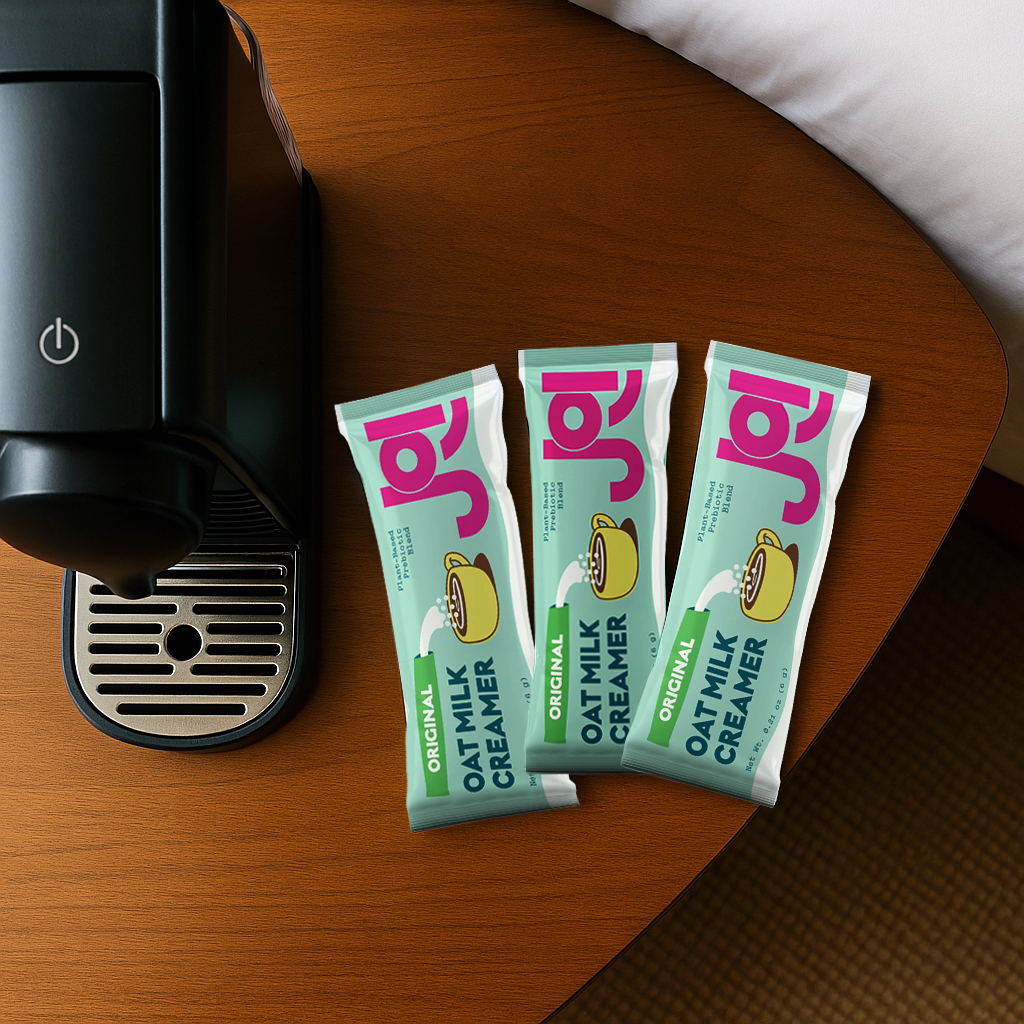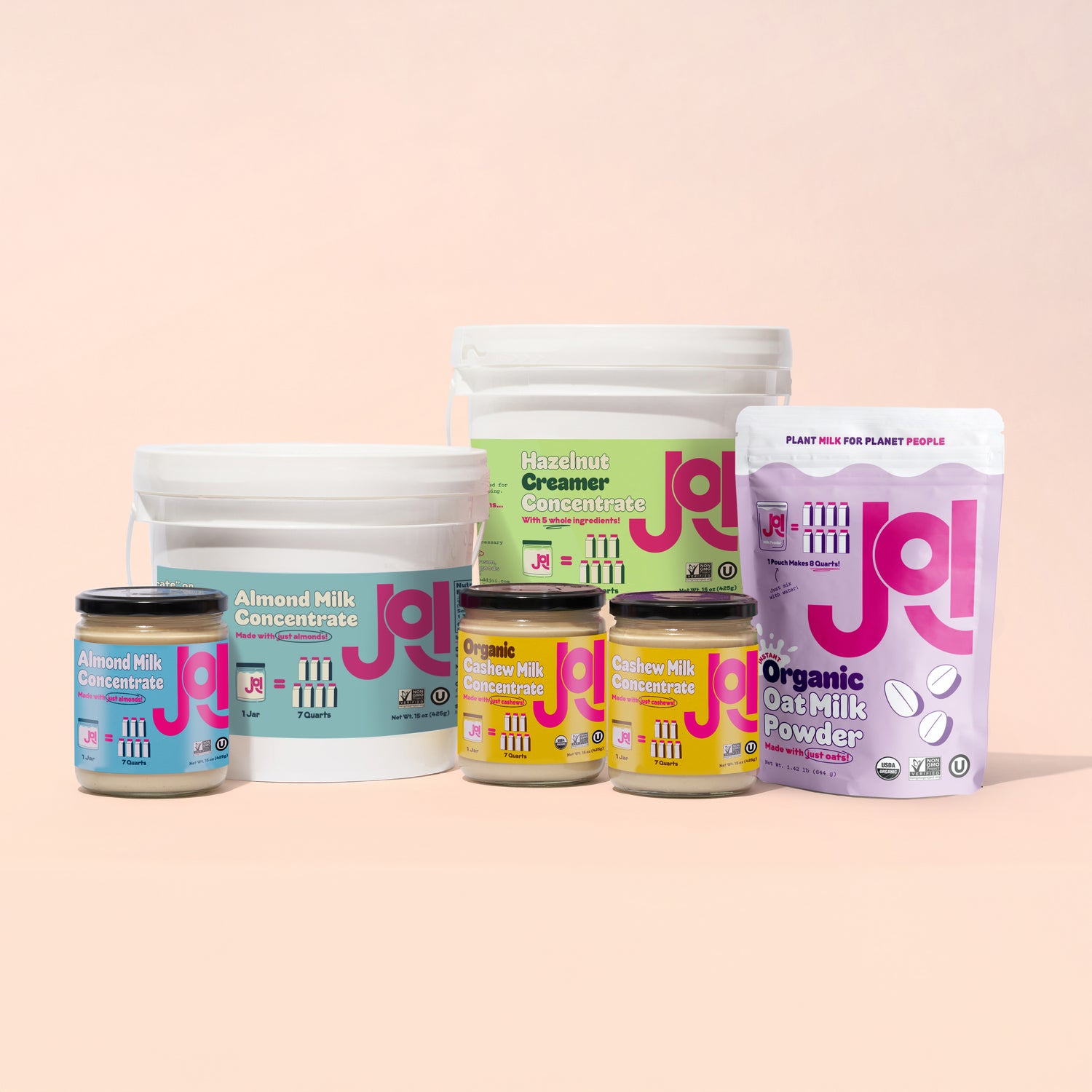
A Foodservice Buyer’s Guide to Non-Dairy Coffee Creamers (Clean, Barista-Friendly Options)
Share
As demand for plant-based options soars, foodservice buyers at hotels, office coffee programs, and large chains are rethinking the humble coffee creamer. Non-dairy coffee creamers have evolved from niche alternatives to mainstream must-haves, now comprising about 14% of the creamer market and rising fast.
From boutique brands to giants like Starbucks and Nestlé, everyone is embracing plant-based. Creamers but not all non-dairy creamers are created equal.This guide will walk you through what to look for – clean label ingredients, shelf-stable formulations, sustainable packaging, and barista-friendly performance – so you can choose the best options for your coffee stations and customers.
The Growing Demand for Plant-Based Coffee Creamers in
Foodservice
In cafes, hotel breakfast bars, and office break rooms, more customers are seeking dairy-free creamers for their coffee. Reasons range from dietary needs (lactose intolerance, vegan lifestyles) to wellness and sustainability concerns. Offering a quality non-dairy creamer is no longer just about accommodating a few guests – it’s about elevating your coffee program’s appeal to a broad audience.
Why now? Consumer preferences have shifted toward plant-based everything, including in their morning cup. Many people perceive plant-based creamers as healthier and more environmentally friendly than traditional dairy or artificial creamers. Consequently, foodservice operators are expanding their coffee condiment selections to include at least one plant-based coffee creamer option. In fact, the plant-based creamer category is growing rapidly, and even legacy creamer brands have introduced almond, oat, or
coconut-based versions to keep up. For a foodservice buyer, keeping pace with this trend is essential for customer satisfaction and staying competitive.
Clean Label Ingredients: The New Standard for Creamers
Today’s consumers care about clean label coffee creamers – products made with simple, recognizable ingredients and free of unnecessary additives. Traditionally, many non-dairy creamers (especially powdered or shelf-stable ones) relied on hydrogenated vegetable oils and corn syrup solids to mimic the creamy mouthfeel of dairy. They often contained artificial flavors (think hazelnut or vanilla “flavors”) and even sodium caseinate – a milk-derived protein used as a whitening agent. In other words, many old-school
“non-dairy” creamers weren’t truly dairy-free and were loaded with processed ingredients. Modern foodservice buyers and their customers are moving away from those formulations. Clean label means no hydrogenated oils (trans fats), no high fructose corn syrup, no artificial preservatives, and ideally no gums or emulsifiers. Instead, the best plant-based coffee creamers use whole-food ingredients: - Plant oils and fats from natural sources – for example, coconut cream, MCT oil, or avocado oil provide richness
without hydrogenation. - Plant proteins or fibers – such as oat fiber or pea protein, to improve texture and prevent separation, instead of adding gums or synthetic thickeners. - Natural flavors and sweeteners – like real vanilla extract or a touch of cane sugar, rather than artificial flavors or corn syrup.
This clean-label approach isn’t just marketing hype; it directly impacts taste and wellness. A creamer made from organic oats, nuts, or coconut can deliver a rich, creamy experience without the “chemical” aftertaste or health red flags of traditional creamers. For instance, JOI’s Oat Milk Creamer is formulated with organic oats for natural sweetness and prebiotic fiber, plus a bit of avocado oil and MCT oil for a smooth, creamy
texture. Notably, it contains no refined seed oils, no gums, and no weird preservatives – a stark contrast to the ingredient lists of conventional non-dairy creamer packets. By opting for clean label coffee creamers, you cater to health-conscious customers who read ingredient labels and appreciate purity in their cup.
Tip for buyers: Always check the ingredient list. If you see things like partially hydrogenated oil, corn syrup, or sodium caseinate, it’s a red flag that the “non-dairy” creamer is far from plant-pure. Instead, look for creamers that highlight whole ingredients (like almond, oat, or coconut) and clearly state “dairy-free” or “vegan” to ensure they contain zero milk derivatives. Clean label creamers can elevate your coffee service’s reputation, showing that you prioritize quality and wellness.
Shelf-Stable Convenience: Long-Life Creamers for Foodservice
Running a foodservice operation means balancing quality with practicality. One major advantage of many non-dairy creamers are shelf stable. Unlike fresh dairy cream or milk – which require refrigeration and have a short shelf life – the latest plant-based creamers often come in shelf-stable formats. This is a game-changer for hotels, offices, and large chains for several reasons:
- No Refrigeration Needed: Shelf-stable creamers (whether in powder form or ultra-pasteurized liquid cartons) can be stored at room temperature. This frees up valuable fridge space and simplifies logistics, especially for venues like conference centers or hotel rooms where refrigeration might be limited. For example, Nestlé’s Coffee-Mate offers oat milk creamer singles that are shelf-stable and need no refrigeration, underscoring how important this feature has become in the industry.
- Longer Shelf Life: A longer expiration date means less product waste. High-quality plant-based creamers can last many months unopened. Some concentrated plant-base products boast 6-12+ months shelf life in storage.This is ideal for large chains that buy in bulk or operations thathave seasonal fluctuations in demand. You won’t be tossing out spoiled dairy as often – saving cost
and reducing waste. - Easy Storage & Bulk Buying: Shelf-stable creamers can be purchased in bulk cases and stored in a pantry or dry storage until needed. This makes it easier to supply multiple locations or to distribute creamer packets in hotel rooms and office pantries without worrying about immediate expiration.
- Consistency Across Locations: With shelf-stable formats, you can ensure that each outlet (be it a hotel breakfast nook or an office coffee kiosk) has the same product quality. There’s less risk of a location running out because they couldn’t store enough refrigerated stock. Dry powders or concentrates can be shipped and stored easily, ready for use when needed. Shelf-stable doesn’t have to mean heavily processed. New innovations allow creamers to stay fresh without
tons of preservatives. Powdered creamers (made by drying plant milk concentrates) are naturally shelf-stable and often require just water or direct mixing into coffee. JOI’s plant-based creamers, for instance, are sold as powders – you simply stir 1-2 tablespoons of the powder into hot coffee to instantly create a
creamy, frothy addition. The product is designed to dissolve easily and even comes with the option to blend with water to create a larger batch of creamer or milk if desired. Because it’s in powder form, it stays good in a cool pantry for many months.
In the foodservice context, shelf-stable non-dairy creamers mean fewer headaches and more flexibility. You can confidently offer almond, oat, or coconut-based creamer options at self-serve coffee stations without the mess of ice bowls or risk of spoilage. This reliability is key for maintaining a consistent guest experience—no one likes finding the creamer curdled or expired during their coffee break.
Sustainable Packaging: Eco-Friendly Creamers Reduce Waste
Sustainability is a growing priority for businesses and consumers alike. When you’re supplying hundreds of cups of coffee daily, the type of creamer packaging you choose can have a substantial environmental impact. Sustainable non-dairy creamers not only care about what’s inside (the ingredients) but also how they’re packaged.
Think about traditional creamer formats: tiny plastic single-serve tubs or packets of powder with foil tops, plastic bottles for larger liquid creamers, etc. Those single-use plastics add up quickly in landfills. An office of 500 people or a busy hotel can go through thousands of little creamer cups and packets in a month. The deal modern coffee creamer solution should minimize this waste footprint.
Here are some packaging innovations and considerations for sustainability:
- Biodegradable Single-Serve Packets: Instead of plastic thimbles of creamer, some companies now offer single-serve packets made from biodegradable materials. For example, JOI provides its oat milk coffee creamer in travel-friendly stick packs that are landfill-biodegradable. This means that even if those packets end up in the trash, they are designed to break down in landfill conditions over time, reducing long-term pollution. It’s a huge improvement over plastic, which can persist for Centuries.
- Post-Consumer Recycled Materials: Look for packaging that uses recycled content. JOI packs its bulk powder creamers in pouches made from post-consumer recycled materials. By using recycled and recyclable packaging, you support a circular economy. After use, those pouches can often be recycled again, cutting down new plastic production.
- Bulk Formats to Reduce Single-Use Waste: In settings where single-serves aren’t necessary, consider larger bulk packaging or concentrate formats. One concentrated creamer base in a jar can replace dozens of quart cartons of ready-to-drink creamer. Not only do you get the shelf-life benefits, you also drastically cut down on packaging waste. Less packaging means fewer shipments
and a smaller carbon footprint. For instance, one tub of JOI’s plant base concentrate can yield many servings of milk or creamer, translating to fewer containers overall. - Compostable or Recyclable Cups: If you do need small creamers (like for room service or airline trays), seek out those that come in compostable packaging or at least recyclable portions. Some emerging products use plant-based bio-plastic that can compost in industrial facilities. Others might use aluminum cans for larger creamers, which are easily recyclable.
Adopting sustainable packaging not only benefits the planet but can enhance your brand image. Corporate clients and guests notice these details. A hotel that touts its biodegradable coffee creamer packets or an office that eliminated single-use plastic creamers can highlight these moves in their sustainability reports. It’s a win-win: you reduce waste and you appeal to the eco-conscious values of modern consumers.
Tip for buyers: When comparing products, ask vendors about their packaging. Do they offer bulk foodservice packs or only retail sizes? Are the materials recyclable or made from recycled content? Choosing a creamer that aligns with your sustainability goals is an important part of procurement today.
Barista-Friendly Performance: Frothing and Flavor Matter
A non-dairy creamer isn’t just a whitener for coffee – in many cases it needs to perform like dairy cream, especially in espresso-based drinks. Barista-friendly plant-based creamers are those that can steam, froth, and mix seamlessly into coffee without curdling or clumping. This is crucial for any foodservice operation that offers lattes, cappuccinos, or any crafted coffee beverages.
Early plant-based milks and creamers often fell short in this department. You might recall how some almond or soy milks would separate in hot coffee, or how they failed to produce any foam when steamed. In fact, many “non-dairy” creamers on the market still don’t steam or foam like real dairy cream. They might taste fine in a simple drip coffee, but they won’t give you that silky microfoam needed for latte art or that creamy mouthfeel in a cappuccino.
Fortunately, innovation in plant-based creamers has led to products specifically designed for barista use. Here’s what to look for to ensure a creamer is truly barista-friendly:
- High Heat Stability: The creamer should not curdle or separate when added to very hot coffee or espresso. Ingredients like calcium carbonate and fruit-derived pectin fiber can help stabilize the mixture and prevent separation. For example, JOI’s Oat Creamer uses tapioca fiber and citrus pectin to keep the creamer stable and cohesive in hot liquids so your coffee stays smooth to the last drop.
- Ability to Froth: If you plan to steam the creamer (for a latte), it needs the right balance of fats and proteins to create foam. Dairy milk naturally has a protein structure that traps air bubbles when steamed. Some plant-based creamers compensate with plant proteins (like pea or oat protein) or add healthy fats to create a similar effect. JOI’s creamer, for instance, includes a blend of avocado oil
and MCT oil which contribute to a creamy texture - baristas find that it steams and froths in a way that closely mimics dairy. The result is a froth that’s stable enough for latte art and a mouthfeel that’s satisfyingly rich. - Concentration and Customizability: A unique feature of some new creamer concentrates is the ability to customize the consistency. For instance, JOI originally introduced a creamer concentrate that could be blended with water to your desired richness, allowing baristas to tweak how heavy or light the creamer is. While not every operation will do this level of customization, it shows how flexible plant-based solutions can be. At minimum, a good non-dairy creamer should blend
easily with different coffee styles (iced coffees, cold brews, hot espressos, etc.) without issue. - Balanced, Complementary Flavor: The best barista-style creamers have a neutral, creamy taste that complements coffee rather than overpowering it. Oat-based creamers are popular because oat has a mild, slightly sweet taste that pairs well with coffee. Other nut-based creamers (like cashew or almond) should be formulated to avoid excessive nutty aftertaste or bitterness. Many brands offer
flavored creamers (such as vanilla or hazelnut), which can be a bonus for creating flavored lattes without syrups. Just ensure that the flavorings are natural and that the sweetness level is controlled, so it doesn’t limit versatility. A barista-friendly plant-based creamer will typically be only lightly sweetened (or have unsweetened versions) so that it can work for both sweet and non-sweet coffee drinks.
For foodservice buyers, testing is key. It’s wise to request samples of a plant-based creamer and try it in the drinks you plan to serve. Does it foam up in the steam wand? Does it stay homogeneous in an Americano? Does it taste good black coffee as well as in an oat milk latte? Leading suppliers like JOI specifically collaborated with baristas to formulate creamers that perform under cafe conditions, which speaks
to the importance of this feature.
By choosing a proven barista-friendly non-dairy creamer, you ensure that your dairy-free option isn’t a second-class citizen on the menu. It will delight both the customers who need a non-dairy option and those who might simply enjoy it as a delicious alternative to dairy.
Making the Right Choice for Your Business
When selecting a non-dairy coffee creamer for your foodservice operation, consider your specific use-case scenarios. Do you offer self-serve coffee in hotel rooms or conference areas? If so, single-serve packets that are shelf-stable and biodegradable (to reduce litter) could be ideal – for example, JOI’s Oat Creamer singles come in landfill-biodegradable packets perfect for in-room service or office coffee bars. Are you
running a café or coffee bar that steams a lot of milk? Then a bulk barista-ready oat or almond creamer that can be frothed is crucial. Also, think about flavor versatility: an original (unflavored) creamer offers the most flexibility, whereas having a couple of flavored options (like French Vanilla or Hazelnut) can please flavor-seeking customers without needing extra syrups.
Lastly, align your choice with broader brand values. If your company emphasizes wellness, a clean-label creamer with organic, non-GMO ingredients reinforces that message. If sustainability is part of your mission, a product with minimal, eco-friendly packaging showcases follow-through on that commitment.
Conclusion: Elevate Your Coffee Program with Clean, Creamy Innovation
The non-dairy creamer landscape has come a long way – offering solutions that are just as creamy, delicious, and functional as their dairy counterparts, yet far more aligned with contemporary values of health and sustainability. By prioritizing clean label ingredients, shelf-stable convenience, sustainable packaging, and barista-worthy performance, you can delight your guests with a superior coffee experience while supporting your operational needs.
Ready to upgrade your coffee stations with a cleaner, greener creamer that baristas and customers will love? Discover JOI’s wholesale offerings – from oat-based creamers to versatile plant milk bases – and see how easy it is to make the switch. Visit our wholesale ordering page to request samples or place your order today and join the growing movement of foodservice providers putting quality and sustainability at
the forefront of every cup.
Plant-Based Coffee Creamers: A Clean, Creamy Revolution You’ll Love – JOI
https://addjoi.com/blogs/news/the-rise-of-plant-based-creamers-a-creamy-evolution?
srsltid=AfmBOopnrpb0O4m579UexBE0UuW8wXVBa8SdGo3ucv25R5zTmWCkjuee
Non-dairy creamer - Wikipedia
https://en.wikipedia.org/wiki/Non-dairy_creamer
Oat Milk Creamer – JOI Wholesale
https://wholesale.addjoi.com/products/oat-milk-creamer-1
Coffee mate Vanilla Oat Milk Liquid Coffee Creamer Singles .375 fl oz
https://www.nestleprofessional.us/coffee-mate/oat-milk-liquid-creamer-375-fl-oz
Plant- Based Oat Milk Liquid Creamers, Natural Vanilla, 0.38 oz Mini ...
https://www.kerralbert.com/food-service/breakroom-supplies/plant-based-oat-milk-liquid-creamers-natural-vanilla-0-38-oz-mini-
cups-50-box-4-boxes-carton-nes19891ct
JOI introduces new plant-based coffee creamer concentrate - Tea & Coffee Trade Journal
https://www.teaandcoffee.net/marketplace/26770/joi-introduces-new-plant-based-coffee-creamer-concentrate/
Oat Milk Coffee Creamer, Original - Vegan, Non-Dairy, Scoopable – JOI Wholesale
https://wholesale.addjoi.com/products/oat-milk-creamer
Plant-Based Creamer Concentrates - Trend Hunter
https://www.trendhunter.com/trends/plantbased-creamer

